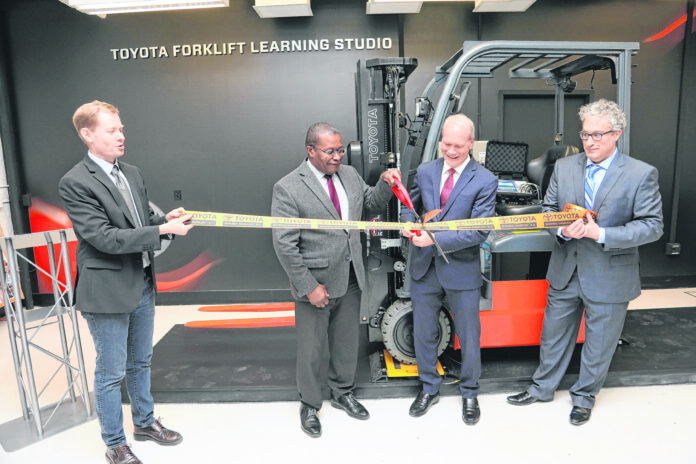
ITHACA, New York – Toyota Material Handling (TMH), North America’s leading manufacturer of forklifts and material handling solutions, joined representatives from Cornell University’s College of Engineering to officially dedicate the revolutionary Toyota Forklift Learning Studio at Cornell University’s Sibley School of Mechanical and Aerospace Engineering.
This is the world’s first Forklift Learning Studio and the result of a unique partnership between TMH and Cornell, bringing students a creative outlet for real-world application in a revolutionary and immersive learning experience that could become a model for impactful change in higher education.
“At Toyota, we believe making things is about making people, and this learning studio is a great example of that guiding principle,” said Brett Wood, Toyota Material Handing North America President and CEO. “Young people often wonder how they’ll use certain theories in their professional lives because it’s often difficult to connect the dots. In the innovative Toyota Forklift Learning Studio, all of the ‘dots’ will exist in the same space as the finished product. This connects perfectly to our Toyota culture of continuous improvement by giving Cornell Engineering students a place for continuous learning and allowing them to explore ways to apply that learning in the real world.”
This state-of-the-art learning studio is equipped with industry-leading products, components and technology that will bridge the gap between students’ coursework and actual commercial products. The forklifts will help students learn about mechanical properties and how they integrate into a larger system while exposing them to many elements of engineering principles like fluid mechanics, heat transfer, hydraulics, engines, transmissions, motors and more. This experimental-learning space, designed with the latest in forklift innovation, encourages outside-the-box thinking, intellectual exploration, and empowers students with a real-life application of the theories taught in classrooms that supports a modern approach to education that balances lecture and lab sessions.
“I became passionate about this when it became clear to me that students were motivated by seeing how what they learned in class applied to their everyday life and to their career opportunities, and they didn’t want to wait very long to get to that point,” said Brian Kirby, associate director of undergraduate affairs for Cornell’s Sibley School of Mechanical and Aerospace Engineering. “The idea behind the forklift learning studio was to lead with the application, and then use that as a framework to decide how it could be linked together in the different classes we teach.”
For more on this story, see Friday’s Republic.




